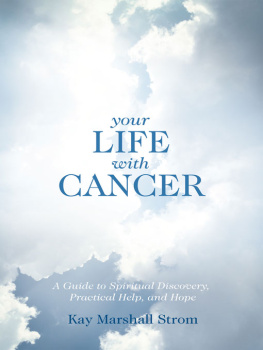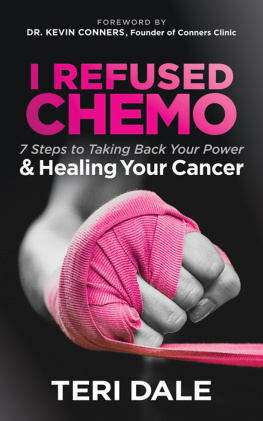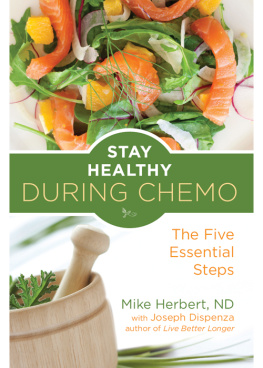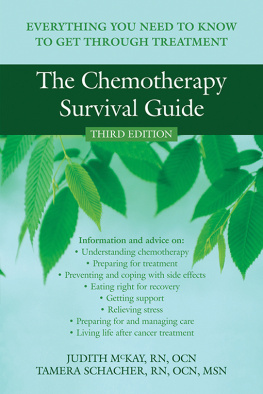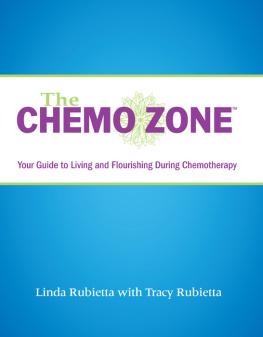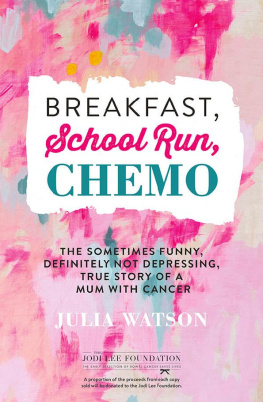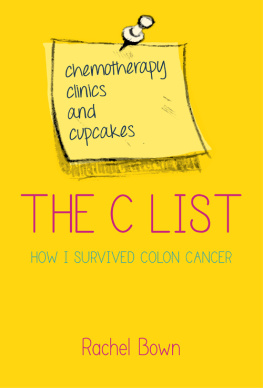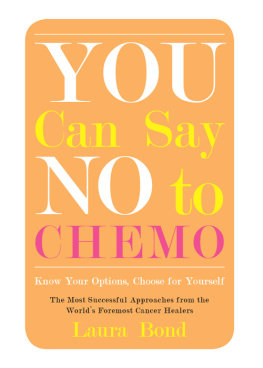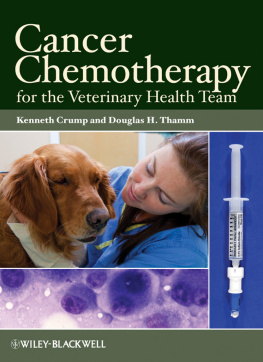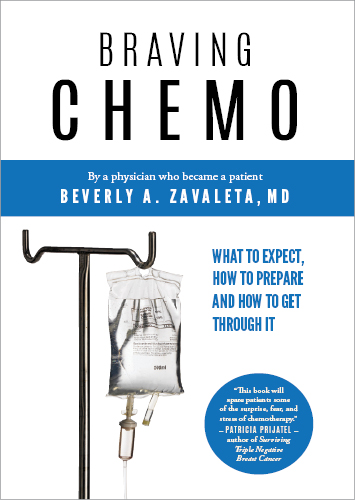Braving Chemo is a book about how to care for yourself in order to feel better while undergoing chemotherapy. This book is for you if:
You have been diagnosed with cancer and will be starting chemotherapy, especially a very intense regimen.
You are currently undergoing chemotherapy, especially a very intense regimen.
You are caring for someone who is having chemotherapy and you want to learn more about what they are going through.
You have a friend or loved one who is having chemotherapy and you want to give the book as a gift.
You are having immunotherapy but not traditional chemotherapy.
You are having radiation and surgery but not chemotherapy.
You are finished with chemotherapy and want a book that focuses on Cancer Survivorshiponly chapter 7 of this book is about Recovery and Survivorship.
Remember that the information and suggestions in Braving Chemo are not meant to replace the advice of your oncologist or other doctors. Always attend your medical appointments, ask questions whenever you need clarification and get permission from your doctor before implementing the advice in this book and especially before starting any new medication or supplement. With this in mind, you can stay informed and work together with your oncologist to make chemotherapy as effective and comfortable as possible.
Introduction
Getting a cancer diagnosis feels like a bomb going offin the doctors exam room, in your brain and in your life. I got my cancer diagnosis news over the phone, since my family physician is also a personal friend. I had been standing in the middle of my sons end-of-school swimming party, loading drinks into a cooler with one hand while my other hand mashed the phone to my ear. When I heard the words infiltrating ductal carcinoma, the most common type of breast cancer, time seemed to slow down. My friend Michelle, hostess of this up-to-now happy occasion, gazed at me with curiosity, then trailed after me as I strode like a zombie through her house and out the front door. I must have turned white, or maybe green, because once I choked out a few words, she said simply, Im here, and pulled me to her in a giant hug.
As a family physician, I had treated many patients with cancer and thought I understood their concerns and needs when they were going through chemotherapy. But after I found myself on the other side of a cancer diagnosis, I began to understand how much I had yet to learn. I thought Id be able to continue working at least part time, as Id urged many patients to do, but due to the intensity of my treatment, I was unable to see any patients or work at all. As time went on, I discovered that for all the challenges I faced as a patient, my training as a family physician and a hospitalist gave me insight that very few cancer patients have. On one hand, I knew immediately how aggressive my cancer was (scary!), but on the other hand, I was able to have detailed discussions with my oncologist about the newest treatment options available (reassuring!). I had my share of setbacks (collapsed lung!), but I used my professional knowledge to protect myself and tried to prevent side effects. Once the mental paralysis of getting a cancer diagnosis wore off, I got busy learning how to care for myself and how to accept help from family and friends.
I went through chemotherapy with a physicians understanding of the side effects, knowing what would happen to my body and why, what to expect and not to expect. If I had a question, I knew where to look to find the answer, and I could understand the explanation. Other cancer patients, however, who lacked my medical training and experience, were struggling to find answers to basic questions. Throughout my several months of chemotherapy treatment, several friends came to me with questions from their own family members who were undergoing chemotherapy during this same period. My friends expressed their loved ones doubts about treatment, difficulties with side effects or questions about diet, and they asked for my help. Apparently, there were many people who felt that they lacked the information they needed to make informed decisions or take care of themselves.
But how could this be? After searching online and in person, I had discovered that there are numerous cancer-focused websites, apps, trackers, organizations, books and helplines. All this information is in addition to the chemo class given by a chemotherapy nurse that most oncologists require their patients to take before starting chemotherapy, as well as the various instruction handouts and information brochures that cancer centers give out. But despite these high-quality resources, I was listening to the stories of people who were struggling and suffering: my girlfriends sister with breast cancer in Michigan, my neighbors cousin with lymphoma in Iowa, the mother of my sons classmate with breast cancer. So it wasnt long before I found myself answering their questions, not in the medical office exam room, but over the phone or via email. As I recovered from my treatment, I continued to answer their chemo questions, and my own, and the compilation of these questions and answers became Braving Chemo .
Braving Chemo is a concise guide for cancer patients undergoing chemotherapy, providing answers to the common worries, problems and questions that arise during chemo. From what to take with you to treatment to how to hang in there when you feel like giving up, this book provides you with the answers and guidance you need at a time when your body, mind and spirit feel overwhelmed and making any decision at all can be a monumental feat. Even if you are not the patient but instead are the support person for someone having chemotherapy, this book will be a valuable resource for you to inform yourself about what your loved one needs to know during chemo.
We all have different learning styles and most people need to see or hear information more than once in order to remember it. Some people prefer to research a topic thoroughly and read in-depth, while other people would rather have a bulleted list of instructions. Braving Chemo isnt meant to replace the instructions that you get from your oncologist and chemo treatment team but rather to compliment and augment the advice. Braving Chemo is a convenient reference manual for you to have on hand at home, and together with the information from your oncologist, you can use the guidance in the book to make your chemotherapy treatment more effective and less unpleasant.
I have organized this book so that you wont need to read it cover-to-cover or in any particular order, since I know that you dont always have the time nor the stamina to do so. If you need to read it on and off, out of order, or return to parts of it again, thats okay. Each topic will stand on its own. If you read the book all the way through before you begin chemotherapy, thats greatyou will be well prepared. If you read each section as it applies to where you are in your chemo treatment, that will work too.


